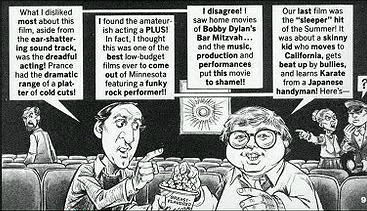Remembering Roger Ebert
 |
As was true for so much of pop-culture for an expat kid without a TV, my first exposure to Roger Ebert (who died today of his recurring cancer) along with his frequent associate Gene Siskel, was through the pages of Mad magazine, wherein they were called “Gene Sissy” and “Roger Ebore.” Mad used them as a framing device when they didn’t feel like doing full-length movie spoofs, but just bits and pieces of various films. I gleaned enough from this satires that when I first saw Back to the Beach on cable (which I watched solely because Pee-wee Herman was on the poster) I got the joke when that film also spoofed them, even though I had never seen the real Siskel and Ebert.
Growing up, my experience with film critics as seen on TV was limited to the late Michael Dwyer – cold, very Irish and uncomfortably staring directly into a camera – and Barry Norman, who came across like a warm English grandfather. Both formed my view of what critics were, which I think is the view a lot of people still (somewhat falsely) have – they liked foreign movies and dramas best, and mostly panned movies aimed at kids and teens, even the more creative ones like Labyrinth or Big Trouble in Little China. It was stunning to me, then, when Gene Siskel gave his thumbs up to The Return of Swamp Thing. Especially since, within his pairing, he always seemed the more highbrow of the two. Ebert was usually the one I could count on to judge a movie based upon the criteria it set out for itself – that he wrote the screenplay for Beyond the Valley of the Dolls proves he could love lowbrow as much as anybody.
Ebert’s legacy – which is at least partly Siskel’s as well – is controversial to some, who would say that he somehow “reduced” criticism to a thumbs up/thumbs down model that Rotten Tomatoes has taken and run with. The flip side of that, though, is that he got the general public to care about film criticism – that any are mourning his loss now is a testament to that. Your average non-scholar will usually say to a critic something along the lines of, “Just tell me what’s good.” And while I would have preferred the option of a neutral thumb (sideways, perhaps?), that’s what Ebert did. Conversely, people could (and should) actually read his columns – TV necessarily simplifies, but his written reviews proved he was the best for a reason – you felt like he was a smart friend talking to you, but not down to you. I would hypothesize that, whether they know it or not, many of the unpaid bloggers who review movies online today do so in some way because of Ebert. In turn, he was one of the first major critics to recognize the opinions of such people as equally valid. We should note that he was also the first film critic to win a Pulitzer, and he has his own star on the Walk of Fame.
I fear that the new media model means there can never be another like him – not because it’s impossible to have the talent, but because there no longer exists any real forum for a critic to focus solely on reviewing, let alone for any substantial length of time to turn it into a career. With social media, we are now a nation of critics. And I get the sense that in many ways, he was okay with that.
I can’t imagine what the last seven years were like for him, unable to eat, speak or taste food, yet still hugely vocal online and in print. I never got to meet him – in my years as a film critic, I can say that any acknowledgment from him would have meant the world – but I did get my minor fanboy moment when I once commented on his message board and he responded. He had asked how one could ever turn a Mike Leigh movie into a video game, and I suggested a Gilbert and Sullivan karaoke game based on Topsy Turvy. His response was something like “Bonus points for the Grand Poo-bah!”
He announced a semi-active retirement (“leave of presence”) just two days ago, as his cancer had returned; I think once you stop doing the thing you love most, it’s a warning sign. Honestly, when you get something so severe as a partial jaw removal, the clock is probably limited, but he took that setback with as much grace as I could ever imagine.
I hope he won’t sue me from beyond the grave for using his trademark…but cancer gets Two Thumbs Down. Looking at the outpouring of memories and favorite quotes on social media, I think his greatest achievement may have been to remind us that critics matter, not just as opinion-makers but as human beings.
